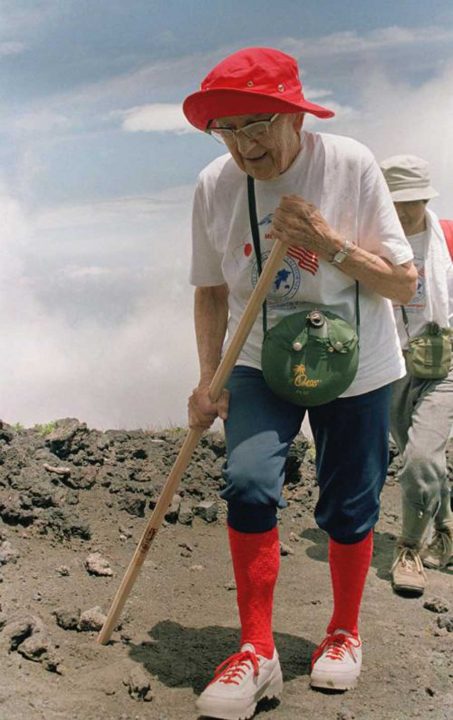The views expressed in our content reflect individual perspectives and do not represent the authoritative views of the Baha'i Faith.
Many years ago, I read about a woman named Hulda who, at age 91, climbed mountains. I was so inspired by that story that I saved the magazine article in a file in my home office.

From time to time I add to this “inspiration” file, with motivating ideas from a magazine, a newspaper, or a printout from a website.
Another favorite item in that file is the story of a truly amazing man who swam the English Channel unassisted, despite being a quadruple amputee due to an accident. When I first learned about him, I thought it was the equivalent of the cover story in a supermarket tabloid—but it turned out to be true.
I love going through that file folder, reminding myself about people who do such wondrous and inspirational things. Children who raise money for charity; ordinary people who share all that they have; people who overcome extreme physical or other challenges; folks afflicted with adversity while keeping a cheerful outlook.
I try to relate to them as people and envision the power within them that led to their great accomplishments. My admiration for them creates a relationship as they inspire me to be my own best self, to explore and even extend my own limits.
But when I say they “inspire” me, what am I saying? What does it mean to be inspired? Literally meaning “breathed upon,” the word is frequently associated with spiritual practices both outside of and within religious traditions. Applying this to the Baha’i teachings, we find both prayer and meditation.
I think of the former as being supplication for inspiration, and the latter as the means for receiving it.
The most powerful sources of human inspiration are the messengers of God. Their presence and teachings “breathed in” new guidance and renewed potential in human society. With Baha’u’llah as the most recent of the prophets, the message of unity has been breathed into the world and is gradually making its way throughout human society:
Grant, O Thou Loving Lord, that all may stand firm and steadfast, shining with everlasting splendour, so that, at every breath, gentle breezes may blow from the bowers of Thy loving-kindness, that from the ocean of Thy grace a mist may rise, that the kindly showers of Thy love may bestow freshness, and the zephyr waft its perfume from the rose garden of divine unity. – Abdu’l-Baha, Selections from the Writings of Abdu’l-Baha
Many people find that inspiration helps them to transcend their usual abilities, prompting them to higher levels of thought and deeds. This is the case when one person inspires another, as the story of Hulda has inspired me to keep climbing. In the words of Abdu’l-Baha: “What is inspiration? It is the influx of the human heart.”
As yet another aspect of inspiration, Abdu’l-Baha included it in a list of sources of human knowledge: sense perception, reason, traditions, and inspiration. Though he also discussed the limitations of these ways of knowing, cautioning that they are neither exhaustive nor prescriptive, I do find it helpful to consider the implications.
Taking each of these items separately, we can attain knowledge through what we ourselves perceive, though there are limits to where and when we are present and how we interpret what we perceive. This is where the importance of reason comes in, so that we can intelligently consider our perceptions through the lens of what historians, photographers, writers, artists, and scholars have recorded as well as through conversation with people we respect.
When I first saw this list, I was surprised to find “traditions” on it. Then I considered that word in the broader sense. Not just ritualistic practices, tradition also embraces ideas handed down through the generations. Of course, it is important to apply perception and reason to those as well, especially if traditions have become tainted with prejudice and ignorance.
The list concludes with inspiration, which means being open to breathing in knowledge in perhaps surprising and unpredictable ways. It also involves our being motivated by each other, to be inspired to put more effort into our own endeavors.
Since inspiration can go both ways, much like communications that are sent as well as received, to be an inspiration to others would be a worthy goal. Perhaps this is the challenge we all face: to do something that might inspire others. Whether we ever achieve such heights, and whether anyone notices or even cares, the important thing is to try—to grow and to share whatever we have and do.
















Comments
Sign in or create an account
Continue with Googleor